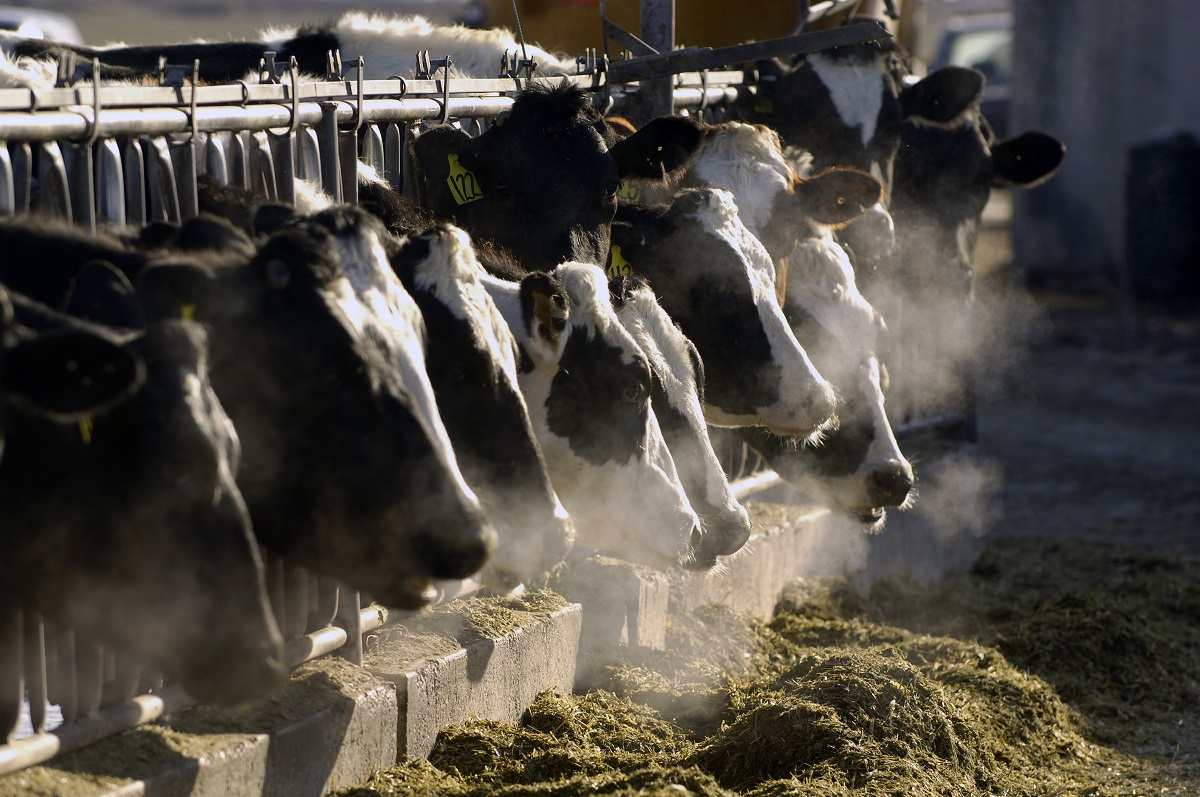
A line of Holstein dairy cows feed through a fence at a dairy farm on March 11, 2009, outside Jerome, Idaho. Greenhouse gas emissions from the way humans consume food could add nearly one degree of warming to the Earth’s climate by 2100, according to a new study Monday, March 6, 2023.
10:48 JST, March 7, 2023
Greenhouse gas emissions from the way humans produce and consume food could add nearly 1 degree of warming to the Earth’s climate by 2100, according to a new study.
Continuing the dietary patterns of today will push the planet past the 1.5 degrees Celsius (2.7 degrees Fahrenheit) limit of warming sought under the Paris climate agreement to avoid the worst effects of climate change, according to the study published Monday in Nature Climate Change, and will approach the agreement’s limit of 2 degrees Celsius (3.6 degrees Fahrenheit).
The modeling study found that the majority of greenhouse gas emissions come from three major sources: meat from animals like cows, sheep and goats; dairy; and rice. Those three sources account for at least 19% each of food’s contribution to a warming planet, according to the study, with meat contributing the most, at 33%.
All emit large amounts of methane, a potent greenhouse gas with more than 80 times the warming power of carbon dioxide, in the way they are currently farmed. The researchers calculated that methane will account for 75% of food’s share of warming by 2030, with carbon dioxide and nitrous oxide accounting for most of the rest.
“I think the biggest takeaway that I would want (policymakers) to have is the fact that methane emissions are really dominating the future warming associated with the food sector,” said Catherine C. Ivanovich, a climate scientist at Columbia University and the study’s lead author.
Ivanovich and colleagues from the University of Florida and Environmental Defense Fund calculated the three major gases produced by each type of food over its lifetime based on current consumption patterns. Then they scaled the annual emissions over time by gas based on five different population projections.
And then they used a climate model frequently used by the United Nations’ panel on climate change to model the effects of those emissions on surface air temperature change.
Stanford University climate scientist Chris Field, who wasn’t involved in the study, said it used well-established methods and datasets “to produce a novel, sobering conclusion.”
“The study highlights that food is absolutely critical to hitting our Paris Agreement climate targets — failure to consider food is failure to meet our climate targets globally,” said Meredith Niles, a food systems scientist at the University of Vermont who was not involved in the study.
The study offered some ways to change global food production and consumption that could limit warming.
Many of these changes are already being called for or adopted. U.S. President Joe Biden touted the climate benefits of planting cover crops that can draw down carbon from the atmosphere in an April 2021 address to Congress. Multiple recent studies and reports have recommended eating less meat in order to reduce greenhouse gas creation by animals raised for consumption. And California started a mandatory food waste recycling program in 2021 to reduce the emissions created by decaying food.
But reducing methane may be the most important goal of all. Although methane is far more potent than carbon, it also is much shorter-lived — meaning cuts in methane emissions can have a quick benefit, Ivanovich siad.
“So that’s going to help us stay under the dangerous warming target,” she said, “as well as give us some time to build up resilience and adaptation to climate change in the meantime.”
A major question that remains is whether food producers and consumers can change their behavior in order to achieve the reductions in greenhouse gases laid out in the study. There’s a roadmap, but will it be followed?
“Changing behavior, especially when we are bombarded with constant media extolling the benefits of everything from Coke to french fries, from pizza to burgers, is pretty damned difficult,” Columbia University plant physiologist Lew Ziska in an email to the AP. “So, overall, while we need to change, whether we can change is …. problematic.”
Top Articles in News Services
-

Survey Shows False Election Info Perceived as True
-

Prudential Life Expected to Face Inspection over Fraud
-

Hong Kong Ex-Publisher Jimmy Lai’s Sentence Raises International Outcry as China Defends It
-

Japan’s Nikkei Stock Average Touches 58,000 as Yen, Jgbs Rally on Election Fallout (UPDATE 1)
-

Japan’s Nikkei Stock Average Falls as US-Iran Tensions Unsettle Investors (UPDATE 1)
JN ACCESS RANKING
-

Japan PM Takaichi’s Cabinet Resigns en Masse
-

Japan Institute to Use Domestic Commercial Optical Lattice Clock to Set Japan Standard Time
-

Israeli Ambassador to Japan Speaks about Japan’s Role in the Reconstruction of Gaza
-

Man Infected with Measles Reportedly Dined at Restaurant in Tokyo Station
-

Videos Plagiarized, Reposted with False Subtitles Claiming ‘Ryukyu Belongs to China’; Anti-China False Information Also Posted in Japan























